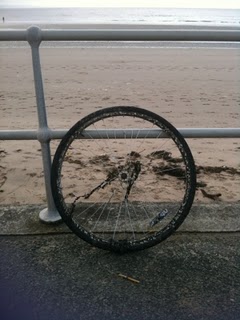I’ve been working to combine various drafts into a single good one over the last few weeks, and I’ve found myself strangely reluctant to use old work. If it’s bad I’m contemptuous, and I rewrite, If it’s any good I’m seized by an urge to start again from scratch just to prove that I haven’t lost it. When I use any work that’s more than a few days old I feel almost as if I’m plagiarising myself.
In fact the whole editing process sometimes seems like cheating, as if I should have got it right when I was in the happily churning out those successive first drafts.
There is something to be said for getting it right first time, of course, and I have huge admiration for those that can do it. And perhaps it’s true, as some have argued, that the wordprocessor has turned us all into endless rewriters. I had a computer at university, but only just (ah, the Amstrad PCW with its tendency to ghost type characters at random – now that’s personality).
Despite my evolutionarily challenged hardware, I’d not quite got to grips with working straight onto the screen. Instead I wrote in long hand and then (usually throughout the last 24 hours before a deadline) I laboriously transcribed my work. If I’d spent a summer learning to touch type in South Kensington before and not after I earned my degree, it woould have saved me a lot of time. But no, I was essentially a scrawler still.
Even with a pen and paper, though I was a cutter and a paster. I chopped up bits of lined A4 and taped them back together in tattered and malformed configurations. I also numbered paragraphs, and swapped the numbers about [5 GOES HERE], until my dissertation drafts looked like those roleplaying books (if Harry attacks the monster go to page 7, if Harry engages it in debate about the contradiction of Plato the Apollonian playwright turn to page 26).
So here I am. The innate editor, reluctant to edit my own work. Partly I think this stems from the attractions of the first draft. The act of writing is romantic, even heroic. First drafters invent new worlds, destroy word count records, engange in mysterious relationships with their characters who spontaneously develop independent lives.
Editing on the other hand is analytical. It’s code and accountancy. There’s less flow, and you have to bring a different kind of concentration to the process. It’s also much harder to quantify. I love to announce I polished off 1000 words. It’s like a mileage count to a runner, a good end in itself. There are fewer bragging rights to be had from an editing session.
On the other hand, and this is where it gets good, I also love the fact that it’s cheating. I can take something I know is bad, and have a shot at transforming it. I start at the high level, fixing structure, character, motivation, and then work down to enhance scenes, setting, symbolism, until finally I allow myself to agonize over paragraphs, sentences and words.
Editing is where you pay the bill for all the flexibility you enjoyed in the draft. If you changed a character’s name three times, that’s fine. If you left notes to self like [Bill says something funny here], then great. Three versions of your story in three parallel rewrites? Super. Now you pay by making it all work.
The first draft lets you pretend you’re a writer. It’s in the edit that you have to prove it.





